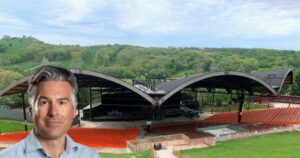Alpine Valley Music Theatre is one of Wisconsin’s largest music venues. With seating for over 37,000 guests and a 2022 lineup that included acts like Slipknot, Dave Matthews Band, and Phish, the famed venue welcomed hundreds of thousands of music fans over the summer.
And those thousands of fans generated thousands of pounds of garbage.
Enter Quintin Bendixen.
Bendixen is the sustainability coordinator at Alpine Valley. He’s also a two-time UWM alum, earning his Bachelor’s degree and Master’s degree in Geosciences, who now teaches sustainability and geosciences classes at both UWM’s Milwaukee and Waukesha campuses. That gives him access to an army of students who signed on as sustainability interns this summer to help Bendixen and Alpine Valley work toward the venue’s goal of zero waste.
“We did pretty good,” Bendixen said of his interns. “We got to 70% waste reduction over the year, which is pretty great.”
Building his position
The sustainability coordinator position is a relatively new one. Alpine Valley Music Theatre is run by the company Live Nation, which operates about 100 music venues across the country. Live Nation has adopted numerous sustainability goals for its venues. Bendixen said those models were helpful when he started the job in spring.
“We look at our water footprint and our energy footprint,” Bendixen said, pointing out Alpine Valley’s rainwater capture system (the bathrooms are all flushed with rain water) and its energy saving initiatives.
“The biggest factor is probably trying to achieve zero waste,” he added, “which is tricky to do. If anyone’s been to a big concert like Summerfest, you know you practically kick up plastic cups as you walk around. We’re trying to achieve goals that lead us as close as possible to zero waste.”
To achieve that, Alpine Valley Music Theatre needs to recycle as much of its waste as possible. And to do that, Bendixen needed to make sure the recycling was sorted. If a recycling is “contaminated” with too many non-recyclable materials, Bendixen explained, recycling centers will throw everything out.
“I think we as a society overestimate how recycling works,” he said. “As much as we want it to be, and as much as I hope it would be, what goes into our recycling containers isn’t always necessarily going to be recycled.”
To that end, Bendixen recruited a number of interns drawn from the Milwaukee campus’ Conservation and Environmental Science program and from his geosciences classes at the Waukesha campus. He trained his students on how to sort through the mountains of trash leftover at the end of each concert to make sure that they recovered as much recyclable material as possible.
A culture of sustainability
Live Nation’s push for sustainability is both good for the planet and good for its business. Going green is a trendy practice these days, and Bendixen noted that studies show that music fans tend to be more environmentallyconscious than others in the population.
In addition, more artists are including “green riders,” or environmentallyminded stipulations that a venue must meet for an artist to perform there. Some riders include directives for locally-sourced food or for recycling and sorting procedures.
“(Being green) is an expectation in the industry now,” Bendixen said. “If we do it right, it lowers our costs. So it’s beneficial to us and it’s beneficial to the planet.”
By Sarah Vickery, College of Letters & Science
